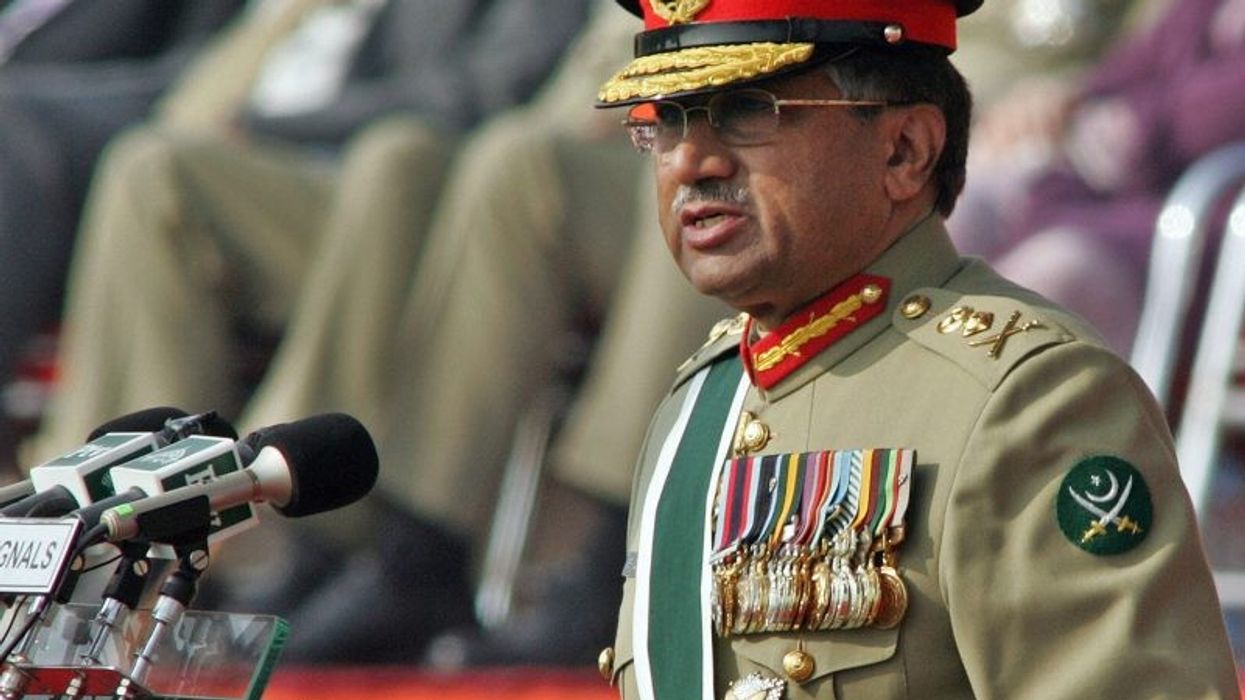Pakistan's former military dictator General Pervez Musharraf, the architect of the Kargil War, toppled the democratically-elected government in a bloodless military coup in 1999 and ruled the country for nine years during which he survived numerous assassination bids.
Born in a middle-class family of Urdu-speaking Mohajir parents in Delhi in 1943, Musharraf migrated to Pakistan with his family after the Partition in 1947. Pakistan's last military dictator died on Sunday as a forgotten man in politics after spending his final years in self-exile in the UAE to avoid criminal charges against him in his country.
He died in the Gulf country after a prolonged illness.
During his stint as the head of the Pakistan government, Musharraf allied with America in the war against terror after the 9/11 attacks on the US and cracked down on Islamist groups and banned dozens of radical outfits, a move that angered radicals. He even escaped assassination attempts in later years.
Musharraf, who was appointed the chief of army staff by the then prime minister Nawaz Sharif in 1998, engineered the Kargil War that took place months after Sharif signed a historic peace accord with his Indian counterpart Atal Bihari Vajpayee in Lahore.
After his failed misadventure in Kargil, Musharraf deposed Sharif in a bloodless coup and ruled Pakistan from 1999 to 2008 in various positions – first as the chief executive of Pakistan and later as the President.
"'Pervez Musharraf, Former Pakistani President, Dies of Rare Disease': once an implacable foe of India, he became a real force for peace 2002-2007," former minister of state for external affairs Shashi Tharoor said in a tweet.
"I met him annually in those days at the @UN & found him smart, engaging & clear in his strategic thinking. RIP," Tharoor said.
Musharraf, who announced elections in 2008 under domestic and international pressure, was forced to resign as president following the polls and went into self-imposed exile in Dubai.
In 2010, he formed his own party, the All Pakistan Muslim League and declared himself the party president. He voiced his opinion of actively taking part in Pakistan’s politics sometime in the future.
He returned to Pakistan in March 2013 to contest polls after living in self-exile for about five years but was hauled to court in different cases - including the 2007 assassination of former premier Benazir Bhutto, treason under article 6 of Pakistan Constitution and murder of Bugti tribe chief Nawab Akbar Khan Bugti.
In 2006, on the orders of Gen Musharraf, the Pakistan Army killed the former junior interior minister and Governor of Balochistan Bugti and over two dozen of his tribesmen, leading to widespread unrest in the area and a surge in the Baloch nationalist sentiment in the province.
In 2019, Musharraf was sentenced to death in absentia by a special court which found him guilty of high treason, for imposing a state of emergency on November 3, 2007, by keeping the country's constitution in abeyance.
The judgement angered the country's powerful Army which has ruled over Pakistan for most of the period since its existence. It was the first time a former top military official had faced such a sentence for treason in Pakistan. The death sentence was later annulled by the Lahore High Court.
Musharraf, who was living in Dubai since March 2016, was also declared a fugitive in the Benazir Bhutto murder case and Red Mosque cleric killing case.
During his tenure, Pakistan saw some structural reforms - ranging from the economic and social sectors to administrative and political restructuring.
Musharraf visited India for the failed Agra summit in 2001 and made two more visits in 2005 as President to watch an India-Pakistan One-day Cricket match and in 2009 to attend a media event after shedding power.
Musharraf, the second of three brothers, spent his early years in Turkey, from 1949 to 1956, as his father Syed Musharrafu-ud-din was posted in Ankara.
On his return from Turkey, Musharraf studied at Saint Patrick's High School, Karachi, and then at FC College, Lahore. He joined the Pakistan Military Academy in 1961 and was commissioned into the Artillery Regiment in 1964.
He fought in the Indo-Pakistan War of 1965 as a young officer, and also participated in the Indo-Pak War of 1971 as a Company Commander in the Commando Battalion.
Musharraf rose to the rank of General and was appointed as the Chief of Army Staff on October 7, 1998, by then prime minister Sharif.
He was given additional charge of the Chairman Joint Chiefs Staff Committee on April 9, 1999. Six months later, he toppled the Sharif government and became the head of the state designated as Chief Executive.
Musharraf got married in 1968 and has two children-a son and a daughter. (PTI)
Pervez Musharraf: Architect of Kargil War, brought Pakistan and India to the brink of war
After his failed misadventure in Kargil, Musharraf deposed Sharif in a bloodless coup and ruled Pakistan from 1999 to 2008 in various positions – first as the chief executive of Pakistan and later as the President.




